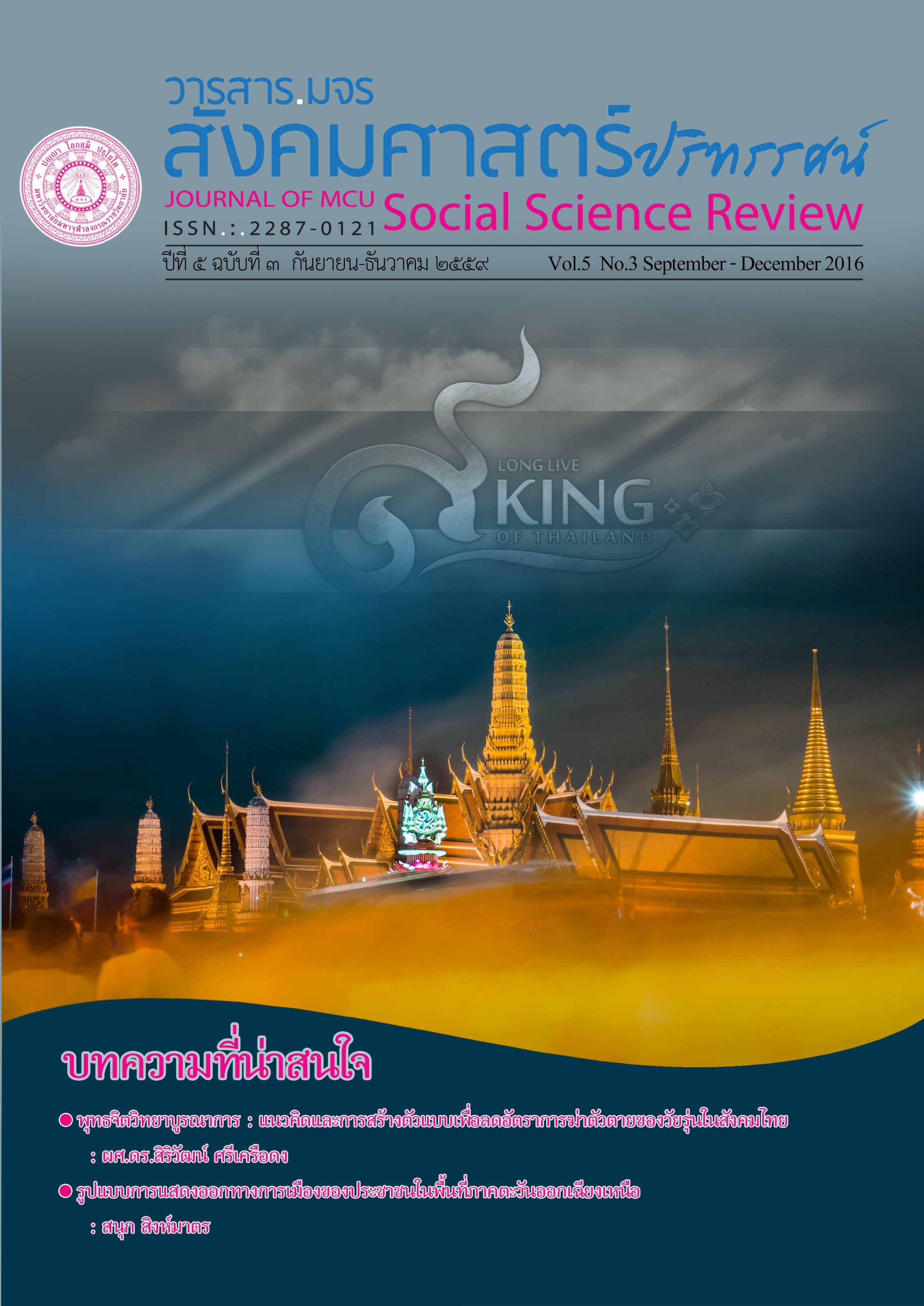ภาวะผู้นำเชิงพุทธกับการจัดการความขัดแย้งในสังคมไทย
คำสำคัญ:
ภาวะผู้นา, ภาวะผู้นาเชิงพุทธ, การจัดการความขัดแย้งบทคัดย่อ
บทความวิจัยนี้มีวัตถุประสงค์ ๑) เพื่อศึกษาแนวดิตเรื่องภาวะผู้นำตามแนวพระพุทธศาสนา ๒) เพื่อศึกษาการจัตการปัญหาความขัดแย้งตามแนวพระพุทธศาสนา ๓) เพื่อศึกษาแนวทางการนำหลักภาวะผู้นำเชิพุทธมาใช้เพื่อจัดการความขัดแย้งในสังคมไทยจากการศึกษาพบว่า ภาวะผู้นำเชิงพุทธนั้นมีลักษณะอยู่ ๓ อย่าง คือ ๑) คุณลักษณะภายนอก คือมีรูปร่างสงงาม น่เคารพศรัทธาเลื่อมใส ตลอดทั้งมีพละกำลังแข็งแรง สุขภาพที่ดีและมีความเพียร ๒) คุณลักษณะภายใน คือมีความรู้ มีวิสัยทัศน์กว้างไกล มีความชำนาญในงานมีมนุษย์สัมพันธ์ดี ๓) มีความแตกต่งจากบุคคลอื่น ซึ่งความแตกต่งนี้จะทำให้ผู้ใต้บังคับบัญชาเกิตความคารพนับถือมีความเชื่อมั่นมีความเชื่อฟังอย่างจริงใจการจัตการความขัดแย้งตมแนวพระพุทธศาสนา จากการศึกษาพบว่า เรื่องที่เกิดขึ้นแล้วจะต้องจัตต้องทำให้ลุล่วงไปมี ๔ ประการคือ ๑) วิวาทาธิกรณ์ ๒) อนุวาทาธิกรณ์ ๓) อาปัตตาธิกรณ์ ๔) กิจจาธิกรณ์ และอธิกรณสมถะเป็นชื่อแห่งสิกขาบทหรือสิกขาบทแห่งธรรม แปลว่า สำหรับระงับอธิกรณ์ มี ๗ ประการ คือ๑.สัมมุขาวินัย แปลว่า ระเยบอันจะพึงทำในที่พร้อมหน้า ๒.สติวินัย แปลว่า ระเบียบยกเอาสติขึ้นเป็นหลัก ให้สมมติ เพื่อการรับรู้ร่วมกัน ๓.อมูฬหวินัย แปลว่า ระเบียบที่ให้แก่ภิกษุผู้หายเป็นบ้าแล้ว ๔.ปฏิญญาตกรณะ แปลว่า ทำตามรับ ๕.เยกุยยสิกา แปลว่า ตัดสินตามคำของคนมากเป็นประมาณ ๖.ตัสสปาปิยสิกา แปลว่า ก๊ริยาที่ลงโทษแก่ผู้ผิด ๗.ติณวัตถารกวินัย แปลว่าระเบียบดังกลบไว้ด้วยหญ้าการนำหลักภาวะผู้นำเชิพุทธมาใช้เพื่อจัดการความข้แย้งในสังคมไทย การศึกษาวิจัยพบว่า ภาวะของผู้นำเชิงพุทธที่จะสามารถจัตการความขัดแย้งในสังคมไทยได้ดีนั้นจะต้องเป็นผู้ที่มีความสามารถในการนำหลักธรรมมาใช้ในการปกครองตน ปกครองคน และปกครองงาน โดยมีหลักธรรมที่จำเป็นต้องนำมาใช้ในการบริหารจัดการองค์กรนั้นโตยหลักการสร้างความสามัคคีปรองตองให้เกิดขึ้นในสังคมซึ่งเป็นหลักดิตหลักธรรมในการทำงานร่วมกันในองค์กร และอยู่ร่วมกันในสังคม มีอยู่ ๑๐ ขั้นตอนในเบื้องตัน ที่จะนำสันติสุขสันติภาพ และภารตรภาพมาสู่องค์กรและสังคมได้ คือ ๑.มองกันในแง่ดี ๒.มีไมตรีจิตที่ตีต่อกัน ๓.สร้างสรรค์ความดี ๔.นึกถึงความดีของกัน ๕.ร่วมกันรักษามีระเบียบวินัย ๖.มีหัวใจพระพรหม๗.สร้างสมความสามัคคี ๘.มั่งมีความเสียสละ ๙.ลดมานะทิฏฐิ ๑๐.ไม่อคติต่อกัน
เอกสารอ้างอิง
กรุงเทพมหานคร : โรงพิมพ์มหาจุฬาลงกรณราชวิทยาลัย, ๒๕๓๙.
กวี วงศ์พม. ภาวะผู้นำ. พิมพ์ครั้งที่ ๔ กรุงเทพมหานคร : ศูนย์ส่งเสริมวิชาชีพบัญชี, ๒๕๓๙.
เจมส์ โค และคณะ (ผู้แต่ง) วันชัย วัฒนศัพท์ และคณะ (ผู้แปล) คู่มือการเพิ่มพลังความสามารถ
กระบวนการจัดการข้อพิพาท. นนทบุรี : สถาบันพระปกเกล้า, ๒๕๕๕.
ฉันทนา บรรพศิริโชติ หวันแก้ว. ความขัดแย้งเบื้องต้นเกี่ยวกับ สันติวิธี และธรรมชาติของความ
ขัดแย้งในสังคมไทย. กรุงเทพมหนคร: โรงพิมพ์จุฬาลงกรณ์มหาวิทยาลัย, ๒๕๔๗.
ฉลอง มาปตา. คุณรรมสำหรับผู้บริหาร. กรุงเทพมหานคร โอเตี้ยนสโตร์, bemnoy.
ชุบ กาญจนประกร. แบบผู้นำ ภาวะผู้นำเชิงสร้างสรรค์. กรุงเทพมหานคร : โรงพิมพ์
มหาวิทยาลัยธรรมศาสตร์, ๒๕๐๙.
ชัยเสฏฐ์ พรหมศ. การจัดการความขัดแย้งในองค์กร. กรุงเทพมหานคร : บริษัท เอ็กซเปอร์เนี่ท
จำกัต ๒๕๕๐.
ธรรมรส โชติกุญชร. ภาวะผู้นำและประสิทธิผลของผู้บริหาร. กรุงเทพมหานคร : คณะกรรมการ
ส่งเสริมงานวิจัยสถาบันบัณฑิตพัฒนบริหารศาสตร์, ๒๕๔๒.
บุญทัน ตอกไรสง. การจัดการองค์การ. กรุงเทพมหานคร : มหาวิทยาลัยจุฬาลงกรณราชวิทยาลัย,
๒๕๔๕..
พระพหมคุณาภรณ์ (ป.อ. ปยุตโต). ภาวะผู้นำ. กรุงเทพมหานคร : สุขภาพใจ, ๒๕๕๙.
พระครูสิริจันทนิวิฐ (บุญจันทร์ ขมกาโม). ภาวะผู้นำเชิงพุทธ. กรุงเทพมหานคร : นิติธรรมการพิมพ์,
๒๕๔๙.
พระธรรมโกศาจารย์ (ประยูร รมุมจิตโต). พุทธวิธีบริหาร. พิมพ์พิเศษ ๕ ธันวาคม ๒๕๔๙.
กรุงเทพมหานคร : โรงพิมพ์มหาจุฬาลงกรณราชวิทยาลัย, ๒๕๔๙.
พระธรรมปิฎก (ป.อ. ปยุตโต). พุทธรรม ฉบับปรับปรุงและขยายความ. พิมพ์ครั้งที่ ๑๑.
กรุงเขพมหานคร : โรงพิมพ์มหาจุฬาลงกรณราชวิทยาลัย, ๒๕๔๖.
พระราชปริย์ติ (สฤษดิ์ สิริธโร) กระบวนการแก้ปัญหาในพระพุทธศาสนาตามหลักอธิกรณสมถะ
กรุงเทพมหานคร : โรงพิมพ์มหาจุฬาลงกรณราชวิทยาลัย, ๒๕๕e.
วรวิทย์ จิตดาพล. ภาวะผู้นำ. กรุงทพมหานคร : สถาบันราชภัฏสวนสุนันทา, ๒๕๔๒.
วันชัย วัฒนศัพท์. ความขัดแย้ง : หลักการและเครื่องมืแก้ปัญหา. ขอนแก่น : โรงพิมพ์ศิริภัณฑ์
ออฟเซ็ก, ๒๕๓๗.
เศาวนิต เศาณานนท์. ภาวะผู้นำ. นครราชสีมา : โปรแกรมวิชาการบริหารศึกษา คณะครุศาสตร์
สถาบันราชภัฎนครราชสีมา, ๒๕๔๒.
พระมหาบุญเศ อินทปญโญ. "สันติวิถีเริ่มต้นที่ชุมชน : กรณีศึกษาภูมิปัญญาท้องถิ่นในการสร้างสันติ
สุขภาคเหนือของประเทศทย". วารสาร มจร สังคมศาสตร์ปริทรรศน์. ปีที่ ๕ ฉบับที่ ๒
(ฉบับพิเศษ) พฤษภาคม-สิงหาคม ๒๕๕๘.
Christopher Moor. The Mediation Process : Practical Strategic for Resolving Conflict,
2nd ed., San Fracisco, CA: Jossey-Bass Publishers, 1996.
Ordway Tead. The Art of Leadership. New York : McGraw-Hill Book Company. Ine,,
1956.
Paul R. Timm and Brent D. Peterson. People at Work : Human Behavior in
Organizations. 5th ed., New York : South-Westem Publishing, 2000.
Ralph Stogdill. Leadership Membership and Organization. Psychological Builletin,
1950.
ดาวน์โหลด
เผยแพร่แล้ว
รูปแบบการอ้างอิง
ฉบับ
ประเภทบทความ
สัญญาอนุญาต
ลิขสิทธิ์ (c) 2016 วารสาร มจร สังคมศาสตร์ปริทรรศน์

อนุญาตภายใต้เงื่อนไข Creative Commons Attribution-NonCommercial-NoDerivatives 4.0 International License.
เพื่อให้เป็นไปตามกฎหมายลิขสิทธิ์ ผู้นิพนธ์ทุกท่านต้องลงลายมือชื่อในแบบฟอร์มใบมอบลิขสิทธิ์บทความให้แก่วารสารฯ พร้อมกับบทความต้นฉบับที่ได้แก้ไขครั้งสุดท้าย นอกจากนี้ ผู้นิพนธ์ทุกท่านต้องยืนยันว่าบทความต้นฉบับที่ส่งมาตีพิมพ์นั้น ได้ส่งมาตีพิมพ์เฉพาะในวารสาร มจร สังคมศาสตร์ปริทรรศน์ เพียงแห่งเดียวเท่านั้น หากมีการใช้ภาพหรือตารางหรือเนื้อหาอื่นๆ ของผู้นิพนธ์อื่นที่ปรากฏในสิ่งตีพิมพ์อื่นมาแล้ว ผู้นิพนธ์ต้องขออนุญาตเจ้าของลิขสิทธิ์ก่อน พร้อมทั้งแสดงหนังสือที่ได้รับการยินยอมต่อบรรณาธิการ ก่อนที่บทความจะได้รับการตีพิมพ์ หากไม่เป็นไปตามข้อกำหนดเบื้องต้น ทางวารสารจะถอดบทความของท่านออกโดยไม่มีข้อยกเว้นใดๆ ทั้งสิ้น





